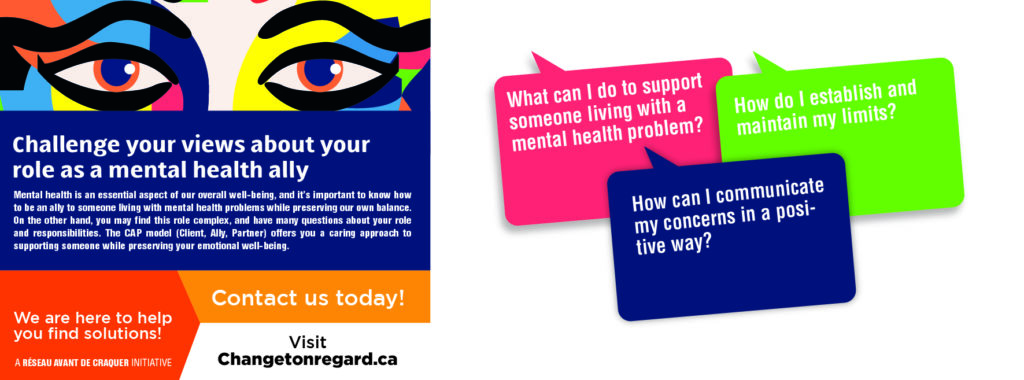Challenge your views about your role as a mental health ally

Mental health is an essential aspect of our overall well-being, and it’s important to know how to be an ally to someone living with mental health problems while preserving our own balance. On the other hand, you may find this role complex, and have many questions about your role and responsibilities. The CAP model (Client, Ally, Partner) offers you a caring approach to supporting someone while preserving your emotional well-being.
As an ally, your role is to team up with the person without taking everything on your shoulders. It means being a trustworthy and empathetic while offering respectful support and open communication. It also means being able to express your concerns in a constructive way, while respecting the limits of your abilities. Remember, as an ally, you’re not responsible for the other person’s recovery.
Here are a few practical tips for being an ally to your parent, brother, sister, boyfriend, girlfriend or friend:
What can I do to be an ally to someone living with a mental health problem?
-
- Show empathy and listen without judgment. Let the person express themself freely and avoid interrupting.
- Educate yourself about mental health issues to better understand what the person is going through and to feel more comfortable with the situation.
- Be present, without trying to solve every problem. Offer your support, your time and your presence to the person. Just being there can be comforting. Try to spend time with the person doing activities they enjoy or simply being there for them when they need it.
- Avoid judging or stigmatizing the person. People need to feel that they are being considered beyond the mental health disorder that affects their daily lives. Respecting their dignity and independence is essential to their recovery.
- Encourage the person to talk about their feelings and needs. Show them that you’re there to support them if needed.
- Encourage the person to consult a qualified mental health professional if you think the situation requires it. If you feel comfortable, you can even help them find resources or even go with them to an appointment and support them in their recovery process.
How do I establish and maintain my boundaries?
- Take the time to identify your limits, think about what you’re prepared to accept emotionally, physically and mentally, and what situations you can’t tolerate. Identify what is acceptable to you and what can be a source of stress or exhaustion.
- Communicate clearly and respectfully. Learn to say ‘’no’’ when you need to, or when you’re being asked to go beyond your abilities or boundaries. You have the right to say ‘’no’’ when you feel overwhelmed or unable to help at any time, to preserve your own well-being.
- Respect yourself as an ally, and remember that you don’t have to feel guilty about setting boundaries. You have the right to protect yourself emotionally and preserve your well-being. It’s also important to explain to the person why these boundaries are important to you, and how this will help you to be a better ally for them in the long term.
- Avoid excessive compromise and make sure you don’t constantly go past your limits to satisfy the other person’s needs.
- Don’t hesitate to seek support from friends, mental health professionals or support groups. Taking care of yourself is essential to being an effective mental health ally.
How can I communicate my concerns in a positive way?
-
- Choose the right time to address your concerns, such as a quiet, private moment. Use non-accusatory language when communicating. Avoid doing it when you’re angry or frustrated. Make sure the other person is also in a good position to talk.
- Address your concerns calmly and respectfully, avoiding criticism or judgment.
- Use open, caring communication.
- Listen carefully to what the person says in return. Be open to the person’s perspective and avoid cutting them off when they express themself. This paves the way for greater understanding.
- Suggest that you look for solutions together. Be willing to work together to find solutions that work for both of you. Show them you’re there to support them through their challenges.
The CAP model (Client, Ally, Partner) offers a respectful, caring approach to supporting a person living with a mental health problem. By showing empathy, setting healthy boundaries and communicating openly, you can offer meaningful support to the person while preserving your own well-being. Don’t forget that you’re not alone in this role, and seeking support for yourself is a good way to feel comfortable in your role as a mental health ally.





